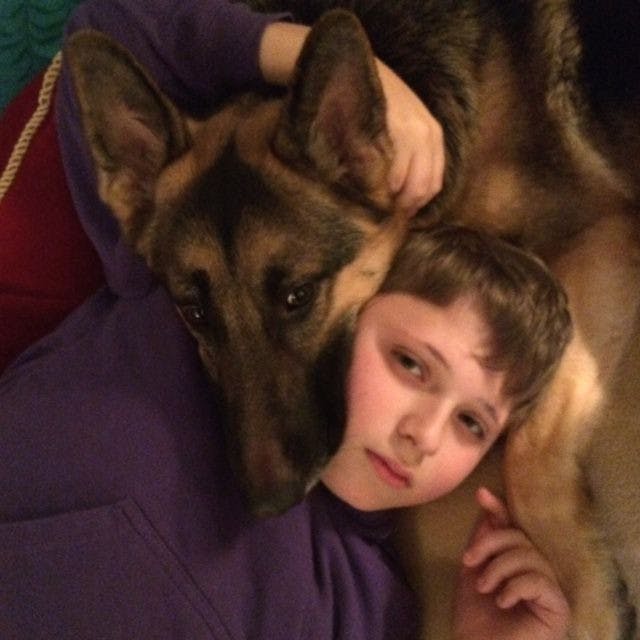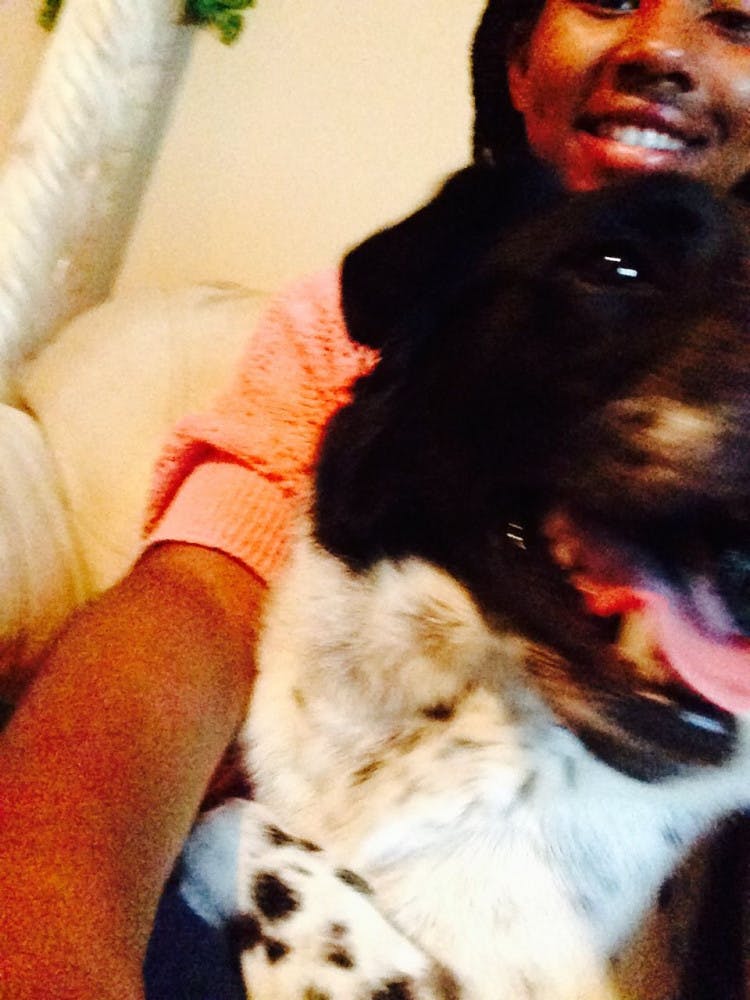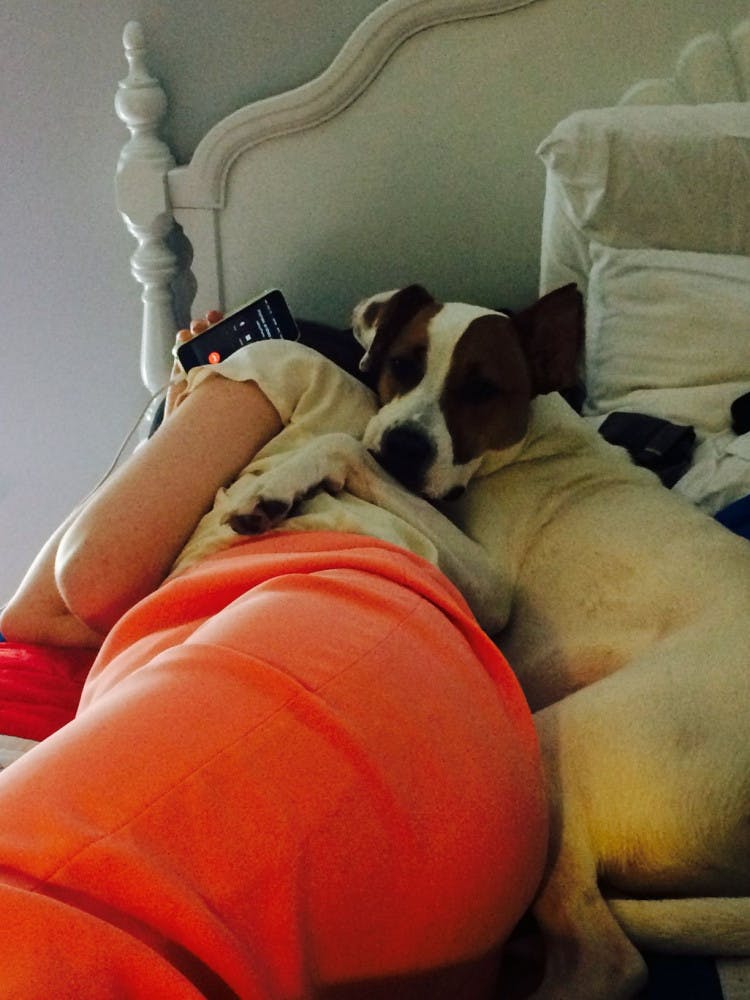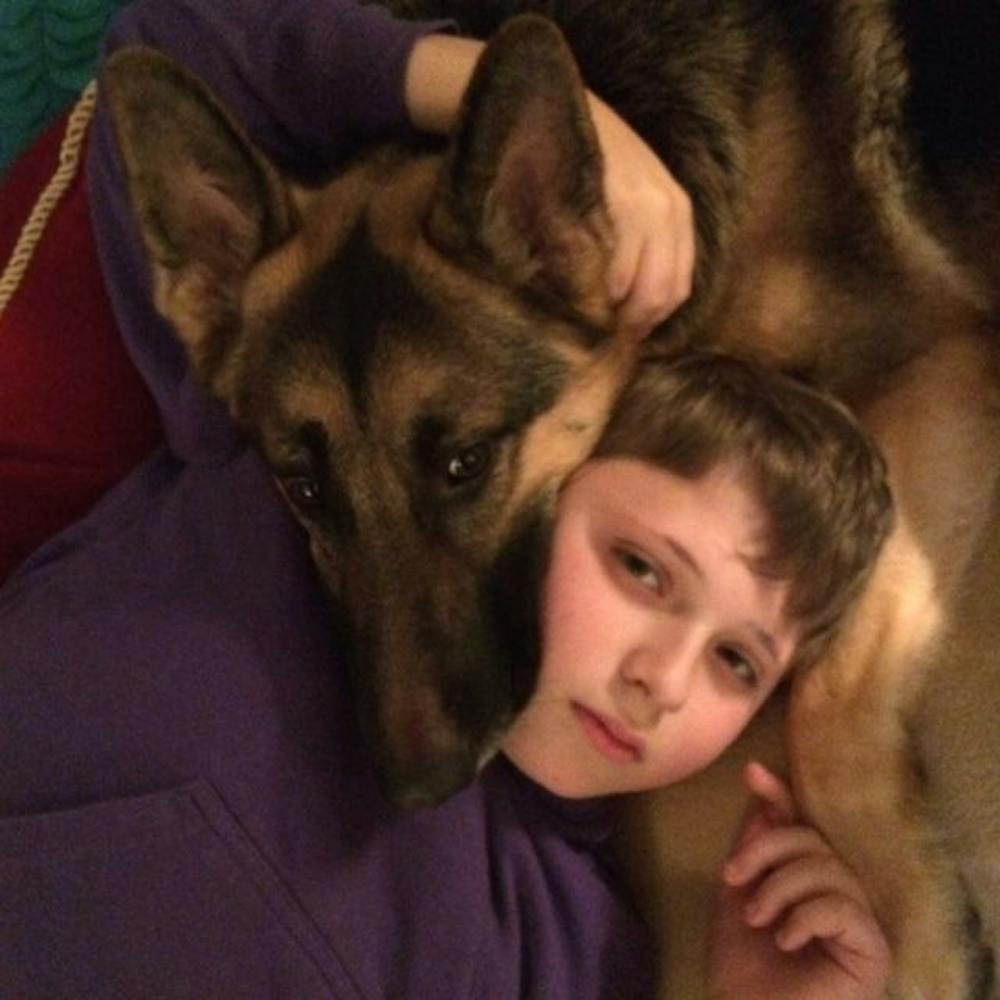Editor’s note: After opening the garage door, my dad walked into our parents’ home. I followed behind him as I always did. He towered over nine-year-old me, and it wasn’t until he stepped out of the way that I met Tanner, the three-year-old chow and golden retriever mix wagging his tail at my feet. It was Easter Sunday in 2001 — one of the happiest days of my life. Tanner became my best friend, and for ten years we cuddled in the living room floor while watching movies and took long rides in the car with the windows down. He died in 2010 — one of the saddest days of my life — after a battle with liver cancer. We buried him in the backyard. The bond I shared with my first dog is one I’ll always carry with me.
The story below is one I’ve wanted to write since I stepped foot in The Daily Helmsman. It’s my final article for the paper — a fitting goodbye before I graduate.

Charlie Cantkier and Gus.
Even with the stereo blasting inside of his mother Jeanne Goddard’s home, a dog’s bark was enough to send Charlie Cantkier into a meltdown.
“He would scream, cry and tell us his brain was going to explode from the pain,†Goddard said.
His hearing was sensitive enough that he’d experience severe sensory reactions to high-pitch yelping or deep, growling from down the street. That was until he met Gus, a 12-week-old German shepherd.
“I had been studying exposure therapy,†Goddard said. “I wondered if Charlie had a sweet little puppy that he could grow with and live with and love, would this dampen his sensory reaction at all? I wanted their first meeting to be calm … I put Gus on Charlie's lap, and they absolutely and completely fell in love with each other.â€
Gus’ parents were imported from Germany — his father a retired K9-cop for the Memphis Police Department and his mother an award-winning schutzhund. Perhaps Gus acquired the traits from his parents, but Goddard said he’s shown “nothing but compassion, empathy, love and intelligence†for Charlie from day one.
It was imperative that Gus and Charlie bond. Charlie needed more than just a friend. He needed a service dog.
Charlie was born happy and healthy on Oct. 23, 2001, at 1:30 p.m. He weighed seven pounds and 14 ounces. For nearly a year, he met the milestones. But between 12 and 18 months, his abilities began to fade. Charlie lost the small bits of language he gained, and he stopped interacting with his family. At the age of two, he suffered from behavioral issues and couldn’t speak. A doctor diagnosed Charlie with low-functioning, non-verbal autism when he was nearly four years old.
“The doctor who diagnosed him told us we should give up our dreams for our child and face the reality that he will never say ‘I love you,’ never form relationships with siblings, family or friends, he would never go to college, get married or have a significant other, have kids or any of the ‘typical’ things parents visualize their children doing eventually,†Goddard said. “But most disturbing was the doctor's warning — that by the time Charlie reached puberty, we would have to institutionalize him.â€
Goddard and her then-husband Mike Cantkier refused to accept the diagnosis. They tried everything — Applied Behavioral Analysis therapy, biomedical interventions and, lastly, Gus.
The therapies and medical interventions recovered Charlie from the various medical conditions causing his autistic-like behaviors — but he still faced debilitating sensory issues. Through caring for and bonding with his new friend Gus, Charlie experienced a 180-degree change in his quality of life. He no longer exhibited a deep fear of dogs and their barking.
“That first year we had Gus, the bond that developed between him and Charlie, I didn't think they could get any closer,†Goddard said. “I was wrong.â€
Where Gus had duties, the devotion was far-reaching. When Charlie was younger, he experienced traumatic migraines. Gus followed him to the bathroom and back to bed, where he kept a paw on his leg until the pain subsided. Charlie would try to run away at times, and Gus would play “hide and seek on steroids†until he found him. When he’d have a sensory overload, Gus would calm him down. When Charlie went to school, Gus walked the halls with him.
Gus has stood by Charlie’s side for more than six years now, and his needs have drastically changed. At six years old, a doctor re-diagnosed Charlie with high-functioning, hyper-verbal autism with superior intelligence. At the age of 10, the same doctor diagnosed him with Asperger’s Syndrome with superior intelligence.
Children don’t usually move on the autism spectrum, Goddard said. But Charlie, now 14, describes himself as a “typical†teenager. He’ll even start the next school year as a freshman at a mainstream high school.
“Gus and Charlie have a relationship more of best friends than service dog and special needs child,†Goddard said. “Gus still sleeps with Charlie every night, but once Charlie is asleep, Gus goes around the house and spends some time with each of his family members. And in the morning, when I go in to get Charlie up for school, Gus is the one that gets on the bed and licks his boy's face to wake him up.â€
The science behind man’s best friend
Dogs share a unique bond — an inherent “man’s best friend†connection — with their owners. Many dogs offer unconditional love. They are at the door after a long day of work, ready to hug or play. For some people, like Charlie, the connection is much deeper.
How exactly did the wolf, a predator, transform into a domesticated companion? Some science, at least, suggests humans and dogs may have co-evolved together over time. Dogs share 99.96 percent of wolves’ genes. But people’s misplaced focus on the dog’s wolf-like nature has led to a misunderstanding of the animal, according to Anthrozoologist John Bradshaw, author of Dog Sense and researcher of animal-human relations. Domestication significantly altered the dog.
“Dogs may be constructed from wolf DNA,†Bradshaw said. “But this does not mean that they are compelled to behave or think like wolves.â€
Many moments, or exchanges with our pets, despite how small they might be, deepen our relationship with them. When dogs and owners gaze into each other’s eyes, both species experience an increase in oxytocin — the love hormone — according to a study in the journal Science.
While humans use more nuanced communication like eye contact to connect with each other, this is atypical for dogs. Scientists behind the study found that early in domestication, dogs could have adopted the trait to bond with humans.
“Dogs instinctively form very strong attachments to people and find contact with the person they’re attached to intensely rewarding in its own right,†Bradshaw said. “[But] they are exquisitely sensitive to our body-language, probably even more so than we ourselves are, and in that area they easily out-perform otherwise much more ‘intelligent’ animals, such as chimpanzees.â€
Domesticated dogs are “the most accessible of all,†said Bradshaw, whose first dog — a labrador and jack russell crossbreed named Alexis — entered his life along with his fiancé in his early twenties.
As a child, Bradshaw grew up in a pet-free home. He grew attached to his grandfather’s dog Ginger, but only through stories. Ginger died before Bradshaw was born.
Bradshaw’s initial research into dogs’ use of scent as communication sparked a deeper interest in the animal.
“From that point I quickly came to realize that the social behavior of dogs was a subject worthy of study,†Bradshaw said.
‘My dog goes wherever I go’

Myesha Logan and Checker.
Three years ago, Myesha Logan stumbled upon a Craigslist ad for a dog the owner couldn’t keep. Checker, a terrier and collie mix, weighed about 32 pounds and wore a coat-covered in black and white spots.
“He didn’t like us at first because he didn’t want to be taken from his previous home,†Logan, a 20-year-old University of Central Arkansas, said. “We owned hyper and outgoing dogs before him. Checker was the first one we had to deal with who was cautious or shy. He got used to me, so he became my dog automatically.â€
Logan and Checker became inseparable. She was at the time attending the University of Memphis and living in the dorms, where she couldn’t keep her dog. Checker stayed with her mom, which worked well for some time, until she decided to move into her new husband’s home. He wouldn’t allow Checker to live with them. Logan sent Checker to live with her brother and his dog, but the distance weighed on Logan, who didn’t want to lose the bond with her pet. Desperate, she transferred colleges and moved to Arkansas to live with her sister.
“My sister’s apartment didn’t allow dogs, so we moved somewhere else where they did,†Logan said. “We did a lot of moving to keep him.â€
Just as Logan felt disconnected after being apart from Checker, it’s not unusual for dogs to experience separation anxiety from their owner, Bradshaw said.
“Separation anxiety, although veterinarians conceive it as a disorder, in fact describes the feelings of most dogs when they are unable to locate their owners,†Bradshaw said. “The majority of dogs hate to be left alone, unless they’ve been specifically trained how to cope.â€
The closer Logan and Checker grew to each other, the more she saw her dog come out of his shell. He’ll now let others aside from Logan rub his belly, but only after he knows they aren’t a threat.
“I didn’t want to give Checker up because I love him,†Logan said.
Checker and Logan are connected at the hip, and it’s his loyalty she appreciates most.
“I moved three hours away for him,†Logan said. “Our bond is unbreakable. He’s like my son.â€
Shelter from the storm

Phillip Young and Arthur.
Â
When Arthur arrived at Grace Animal Hospital, the entire side of his brown and white spotted body was an open wound. His floppy ear, now healed and half-cropped, had a chunk missing out of it. Another dog attacked him. Arthur was just a puppy, and after being stitched back together, the veterinarians crossed their fingers that he’d make it through the night.
He did. And The Streetdog Foundation, a Memphis, Tenn. based adoption organization that picks up dogs living on the streets and rehabilitates them, took Arthur under its wing.
Meanwhile, Lara Cate and Phillip Young searched for a third member to bring into their family.
“We did agree that we shouldn't rush into it,†Lara Cate said. “We [wanted to] find a dog that mirrored us both somehow and fit into our life. Rescuing from a shelter rather than ‘shopping’ is something that was really important to us, so we looked at the pups on their website. We scrolled down to Arthur's picture and that was it — we knew he was the one.â€
Arthur, which they believe is a boxer and a treeing feist mix, was listed as being “adventurous, fun, loving and high energy†— the qualities they were searching for in a pet. Phillip and Lara Cate run for exercise. Phillip said Arthur looked like a runner. Their jobs require both of them to travel, and Lara Cate said she also “convinced Phillip that it was a great idea because we would both have a running buddy when one of us was out of town.â€
Domesticating a street dog proved to be more taxing than they anticipated. Arthur initially didn’t do well with friends or family coming into their home. He only allowed a handful of people into the house without barking or growling.
“It was a struggle,†Lara Cate said. “We had this new dog we were so in love with and wanted everyone to see that, but he was struggling with learning that our friends walking into the house were not there to hurt us or him. I think that [attack] really affected his ability to trust others, people and pups.â€
Love, joy, anger, fear and anxiety — these are primary emotions most likely shared by all mammals, said Bradshaw, “although we can never know precisely what another person is feeling, let alone what a dog feels.â€
Dogs live “more in the here-and-now†than humans do. However, a dog conditioned by abuse may be more skittish. Bradshaw said dogs don’t interpret more complex emotions such as embarrassment, guilt or pride, but their emotional lives revolve around their owners. They develop a learned response to their owner’s criticism.
Phillip and Lara Cate celebrate Arthur’s birthday on Aug. 10, the day they brought him home. They think he is two years old. Since they’ve adopted Arthur, they have watched him — through the couple’s triumphs and obstacles — find his role in the family.
“I was really sick back in the summer and went through a couple of weeks of treatment,†Lara Cate said. “Arthur knew something was up. He could tell we were nervous and exhausted, but he didn't leave my side. When I had to sleep in the bathroom because I was so sick, he laid beside me and nuzzled his head on my neck to tell me it was going to be okay. I don't know how he knew, but he did.â€
Arthur is “equal parts goofball and an all-around badass athlete.†He’s particularly expressive with his droopy eyes and lips — she always knows when he wants to play or nap. If it’s time to snuggle, Arthur wants to be the little spoon. He’s early to bed and early to rise. And when Phillip’s truck pulls into the garage, he offers a yelp because he knows it’s time to go for a run.
“We three are best buds,†Lara Cate said. “Everything Arthur does, he does because he thinks it will make us happy.â€
On their anniversary, Phillip took Lara Cate to her favorite restaurant, Fuel Café, just a short walk from their house. Lara Cate’s sister came over to take Arthur on a walk while they ate dinner. She tied a ring with a bow to Arthur’s collar and hid around the corner at the restaurant. As Phillip and Lara Cate approached Fuel, Arthur ran to greet them. And then Phillip lowered to one knee.
“Now that we have our dog, Arthur, we're building our life together. Would you do me the honor of becoming my wife?†he said.
Lara Cate was “too busy†crying to say yes, she remembers.
“Arthur wrapped his leash around Phillip and I while we hugged and cried together,†Lara Cate said. “We still laugh at the huge gasp I made when I realized what was going on — it is one of our favorite moments together.â€

Lara Cate Young and Phillip.
‘Ri Ruv Ru’
When Charlie’s dad pulls into his mom’s driveway to pick him up, Gus frantically barks. He runs outside and stares both of them down before dragging his tail back into the house.
“I like to think he's using that moment with Charlie's dad to turn over responsibility,†Goddard said.
Gus doesn’t like that he stays home these days when Charlie leaves. But just as Charlie no longer experiences sensory reactions to the sound of barking, Gus has adjusted to his most recent role in his best friend’s life.
And if Gus barks now, it’s to tell Charlie he loves him. His bark, Goddard said, even sounds like Scooby-Doo speak — “Ri Ruv Ru.â€
“I knew this puppy would help me in life,†Charlie said. “And also he's cute, so that's a plus. I knew he would protect me and help me handle loud noises. If I feel sick, he helps me feel better.â€
For dog lovers, a pet plays a pivotal role in their lives. Past the primary emotions a dog capably grasps, perhaps their owners project meaning onto their actions and personalities as their bond deepens. They are no “smarter than most other animals,†Bradshaw said, and their social lives are less complex than that of a spotted hyena. However, it is a dog’s loyalty, among other aspects, that make them man’s best friend.
“It’s the unique combination of their unwavering attention to what we are doing and their profound affection for the people who care for and about them that makes it possible for dogs to carry out so many demanding tasks,†Bradshaw said.
For Goddard, who watched her son’s autism abate through disciplined years of hard work and determination, she said it was Gus who helped shape Charlie into the teenager he’s become today.
“There was a time when Charlie was convinced dogs were evil,†Goddard said. “Now he talks about starting a business where he makes stuffed animals that are replicas of people's pets. He has gained this empathy and nurturing nature when it comes to dogs and other animals — and that's 100 percent because of his relationship and bond with Gus.â€
Before Goddard sends Gus to bed with Charlie, she looks him in the eyes and said a nightly mantra: “You're the best puppy in the world. You're the smartest, the kindest and the most loving. You are the bravest, strongest and the handsomest. You are our gift from the Heavens. Our puppy angel."
Charlie, though, doesn’t buy all of it.
“My mom makes up a story about Gus being from the heavens above,†Charlie said. “She says he has wings and flies around at night watching over us, especially me. I don't believe this. Not that he wouldn't if he could, but you know, he's not from the heavens. He's from nature and science, of course. But because he looks like what an angel should look like if they were real and here, then we can call him angelic.â€






